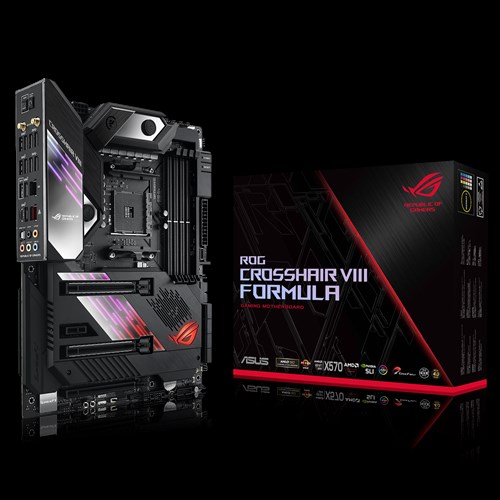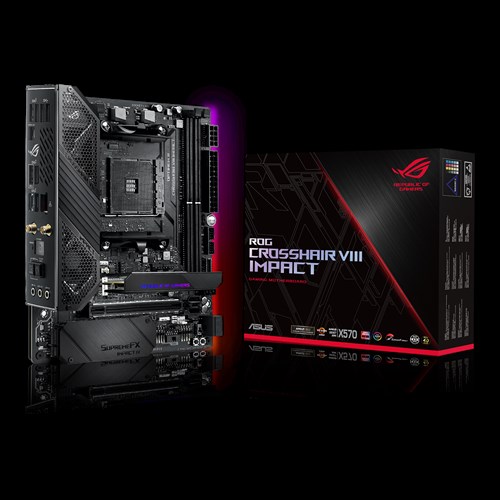ROG Crosshair VIII Formula
![Image]()
Overview
Specifications
The Manual
Drivers & Tools
ROG Crosshair VIII Hero (WI-FI)
![Image]()
Overview
Specifications
The Manual
Drivers & Tools
ROG Crosshair VIII Hero
![Image]()
Overview
Specifications
The Manual
Drivers & Tools
ROG Crosshair VIII Impact
![Image]()
Overview
Specifications
The Manual
Drivers & Tools
ROG Crosshair VIII Dark Hero
![Image]()
Overview
Specifications
The Manual
Drivers & Tools
AMD X570 Drivers & Support
Downloads
Reviews
Formula
AnandTech Overview - 09JUL19
bit-tech - 12JUL19
Overclock3D - 20AUG19
Guru 3D - 06SEP19
TweakTown - 11SEP19
Hero & Wi-Fi
TheOverClocker - 07JUL19
eTeknix - 07JUL19
AnandTech Overview - 09JUL19
Guru3D - 16JUL19
PCGamesN - 18JUL19
Hexus - 26JUL19
TweakTown - 16AUG19
Tom's Hardware - 30SEP19
TechPowerUp - 04OCT19
Impact
AnandTech Overview - 09JUL19
bit-tech - 16SEP19
AnandTech - 25OCT19
TheOverClocker - 06NOV19
TechPowerUp - 03DEC19
Dark Hero
TechPowerUp - 06NOV20
Guides, Testing, & Utilities
Ryzen 3000 Memory / Fabric (X370/X470/X570) (Formula Testing)
ASUS ROG CROSSHAIR VIII HERO Testing On Ubuntu 18.04 Linux
Testing 3rd-Gen Ryzen DDR4 Memory Performance and Scaling
VRM on the new AM4 motherboards (All motherboards listed)
Something GIGABYTE, MSI and AMD do not want you to see
[Official] AMD Ryzen DDR4 24/7 Memory Stability Thread
Strictly technical: Matisse (Not really) (Formula Testing)
AMD Ryzen Memory Tweaking & Overclocking Guide
ROG Crosshair VIII (Formula & Hero) LN2 OC Guide
How to use USB BIOS Flashback & BIOSRenamer
AMD Ryzen 3000 – Part IV – DDR4 Scaling
AMD Ryzen 3000 investigated
DRAM Calculator for Ryzen
DDR4 Overclocking Guide
AMD CPU Stock Tracker
Karhu RAM Test
HWiNFO Utility
Ryzen Master
Prime95
Miscellaneous
Is your Bus Clock/Speed/FSB ~99.8 MHz? Disable SB Clock Spread Spectrum under Extreme Tweaker\Tweaker's Paradise and set BCLK to Auto.
Looking for Mem TweakIt v2.02.44 and/or TurboV Core v1.02.02?
Are you in to gaming and like memory performance? Check these out.
Warning! Check spoiler for new motherboard owners or fresh Windows installs:

Overview
Specifications
The Manual
Drivers & Tools
ROG Crosshair VIII Hero (WI-FI)

Overview
Specifications
The Manual
Drivers & Tools
ROG Crosshair VIII Hero

Overview
Specifications
The Manual
Drivers & Tools
ROG Crosshair VIII Impact

Overview
Specifications
The Manual
Drivers & Tools
ROG Crosshair VIII Dark Hero
Overview
Specifications
The Manual
Drivers & Tools
AMD X570 Drivers & Support
Downloads
Reviews
Formula
AnandTech Overview - 09JUL19
bit-tech - 12JUL19
Overclock3D - 20AUG19
Guru 3D - 06SEP19
TweakTown - 11SEP19
Hero & Wi-Fi
TheOverClocker - 07JUL19
eTeknix - 07JUL19
AnandTech Overview - 09JUL19
Guru3D - 16JUL19
PCGamesN - 18JUL19
Hexus - 26JUL19
TweakTown - 16AUG19
Tom's Hardware - 30SEP19
TechPowerUp - 04OCT19
Impact
AnandTech Overview - 09JUL19
bit-tech - 16SEP19
AnandTech - 25OCT19
TheOverClocker - 06NOV19
TechPowerUp - 03DEC19
Dark Hero
TechPowerUp - 06NOV20
Guides, Testing, & Utilities
Ryzen 3000 Memory / Fabric (X370/X470/X570) (Formula Testing)
ASUS ROG CROSSHAIR VIII HERO Testing On Ubuntu 18.04 Linux
Testing 3rd-Gen Ryzen DDR4 Memory Performance and Scaling
VRM on the new AM4 motherboards (All motherboards listed)
Something GIGABYTE, MSI and AMD do not want you to see
[Official] AMD Ryzen DDR4 24/7 Memory Stability Thread
Strictly technical: Matisse (Not really) (Formula Testing)
AMD Ryzen Memory Tweaking & Overclocking Guide
ROG Crosshair VIII (Formula & Hero) LN2 OC Guide
How to use USB BIOS Flashback & BIOSRenamer
AMD Ryzen 3000 – Part IV – DDR4 Scaling
AMD Ryzen 3000 investigated
DRAM Calculator for Ryzen
DDR4 Overclocking Guide
AMD CPU Stock Tracker
Karhu RAM Test
HWiNFO Utility
Ryzen Master
Prime95
Miscellaneous
Is your Bus Clock/Speed/FSB ~99.8 MHz? Disable SB Clock Spread Spectrum under Extreme Tweaker\Tweaker's Paradise and set BCLK to Auto.
Looking for Mem TweakIt v2.02.44 and/or TurboV Core v1.02.02?
Are you in to gaming and like memory performance? Check these out.
Warning! Check spoiler for new motherboard owners or fresh Windows installs:
If you installed Windows with the original BIOS without updating first, Windows files could get corrupted due to Windows Hardware Errors (WHEA). Please update your BIOS, if you haven't already. To check for errors, run the following commands in a command prompt as an administrator:
sfc /scannow
If corruption is found, run the following command:
dism.exe /online /Cleanup-Image /RestoreHealth
Rerun the sfc /scannow command
Please make sure your BIOS is up to date before installing Windows. :thumb:
sfc /scannow
If corruption is found, run the following command:
dism.exe /online /Cleanup-Image /RestoreHealth
Rerun the sfc /scannow command
Please make sure your BIOS is up to date before installing Windows. :thumb:




